The Ultimate Guide to Personal Coach Career for Beginners (2025)
Imagine stepping into a world where you can change lives—including your own—by starting a personal coach career in 2025. The demand for skilled personal coaches is at an all-time high, making this the perfect moment to explore a profession that blends purpose, flexibility, and growth.
This guide is your roadmap, designed to help beginners navigate every stage of building a rewarding personal coach career. From mastering essential skills to earning respected credentials, you’ll discover how to attract clients, market your services, and keep up with the latest industry trends.
Ready to embark on a journey that empowers others and transforms your future? Let’s dive in.
Understanding the Personal Coaching Profession
Stepping into a personal coach career is more than just changing jobs—it's about guiding transformation for others while growing yourself. Before you start, it's important to truly understand what this profession involves, the opportunities ahead, the skills you'll need, and the realities of the field.
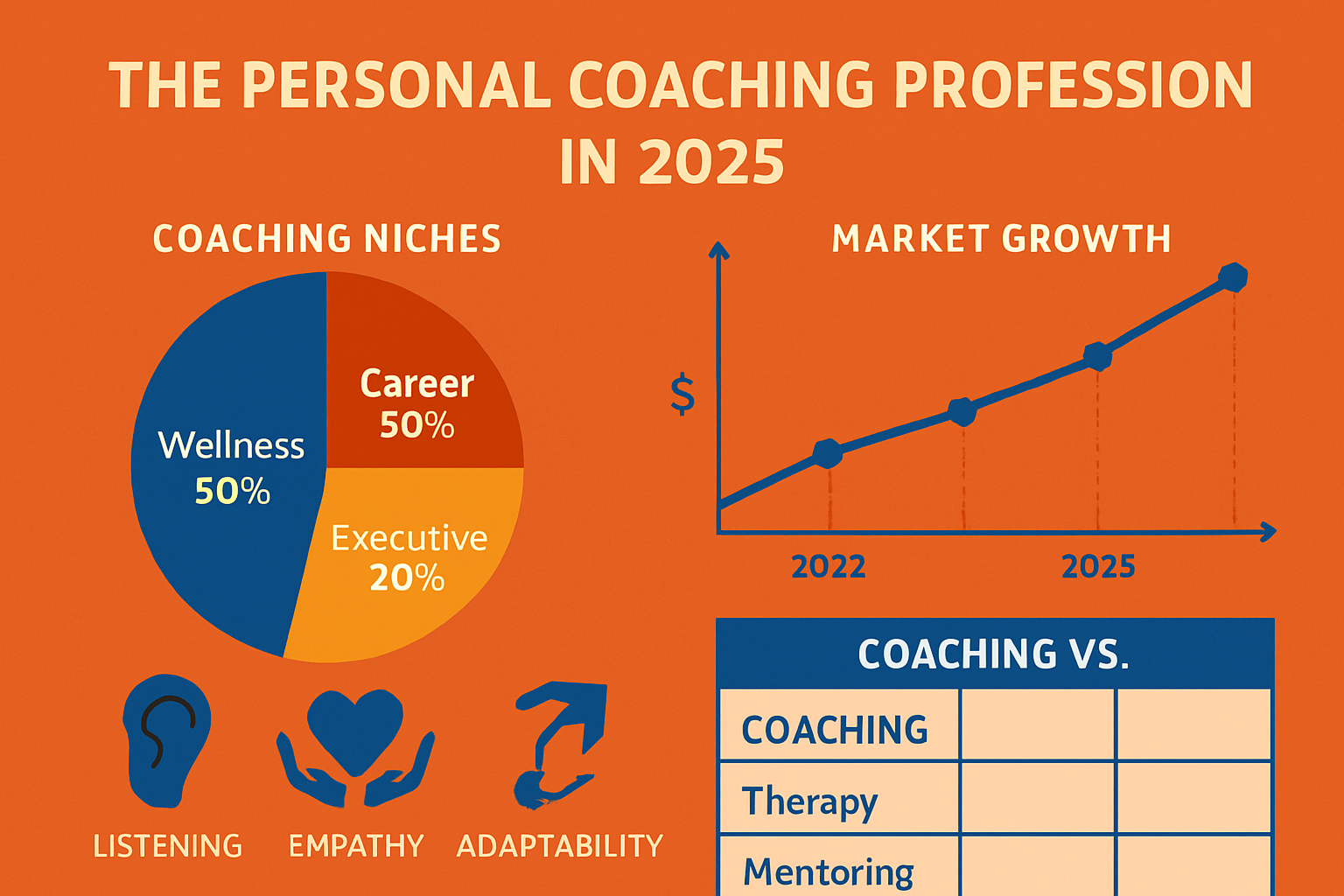
What is Personal Coaching?
A personal coach career centers on helping individuals achieve personal and professional goals through structured guidance and support. Personal coaching typically involves goal-setting, accountability, and fostering self-discovery. Unlike life, executive, or business coaching, a personal coach career often focuses on holistic growth, blending both personal and career aspirations.
Here's a quick comparison to clarify how a personal coach career differs from related fields:
| Role | Focus | Approach |
|---|---|---|
| Coaching | Goal achievement, growth | Future-focused, action |
| Therapy | Mental health, healing | Past-focused, clinical |
| Mentoring | Sharing experience | Advice, guidance |
| Consulting | Problem-solving | Expert solutions |
For example, a personal coach might help a client set and achieve a fitness goal, while a therapist would address emotional barriers behind motivation. This distinction is vital for anyone considering a personal coach career.
Industry Growth and Opportunities in 2025
The personal coach career field is booming in 2025, with the global coaching industry valued at $2.85 billion and expected to grow even further (Global coaching industry valued at $2.85 billion). As more people prioritize well-being and career satisfaction post-pandemic, demand for personal coaching continues to rise.
Key demographics turning to coaching include millennials, working professionals, and executives. The shift to remote coaching opens up worldwide opportunities, letting you work with clients across borders. Emerging niches—like wellness, career transition, and digital coaching—make a personal coach career more versatile and accessible than ever.
Essential Skills and Qualities of Successful Coaches
To thrive in a personal coach career, you'll need a mix of interpersonal and practical skills. The most successful coaches demonstrate:
- Active listening and deep empathy
- Strong communication and motivational abilities
- Expertise in goal-setting and accountability methods
- Adaptability and a commitment to ongoing learning
Consider coaches who’ve built thriving practices by blending emotional intelligence with proven coaching strategies. Lifelong learning and curiosity are core traits that keep a personal coach career fulfilling and relevant.
Common Misconceptions About Coaching
Many myths surround the personal coach career. A common misconception is that anyone can be a coach without training. In reality, effective coaching requires specialized education and often certification.
Some believe coaching is like therapy or simply giving advice. In fact, coaching focuses on future goals, not past trauma, and uses structured techniques. Regulatory and ethical standards matter—89% of coaches have formal training. Clients should expect professionalism and clear boundaries in every personal coach career.
Benefits and Rewards of a Personal Coaching Career
A personal coach career is deeply rewarding. You’ll witness real change in clients’ lives and enjoy the satisfaction of making a difference.
- Flexible work options: remote, part-time, or full-time
- Strong earning potential and room to grow your business
- Opportunities to specialize in areas you’re passionate about
If you’re seeking purpose, flexibility, and growth, a personal coach career offers all three in abundance.
Steps to Becoming a Personal Coach: A Beginner’s Roadmap
Embarking on a personal coach career in 2025 is a journey of both self-discovery and professional growth. To help you succeed, here’s a step-by-step roadmap every beginner can follow, ensuring you build a strong foundation and move forward with confidence.
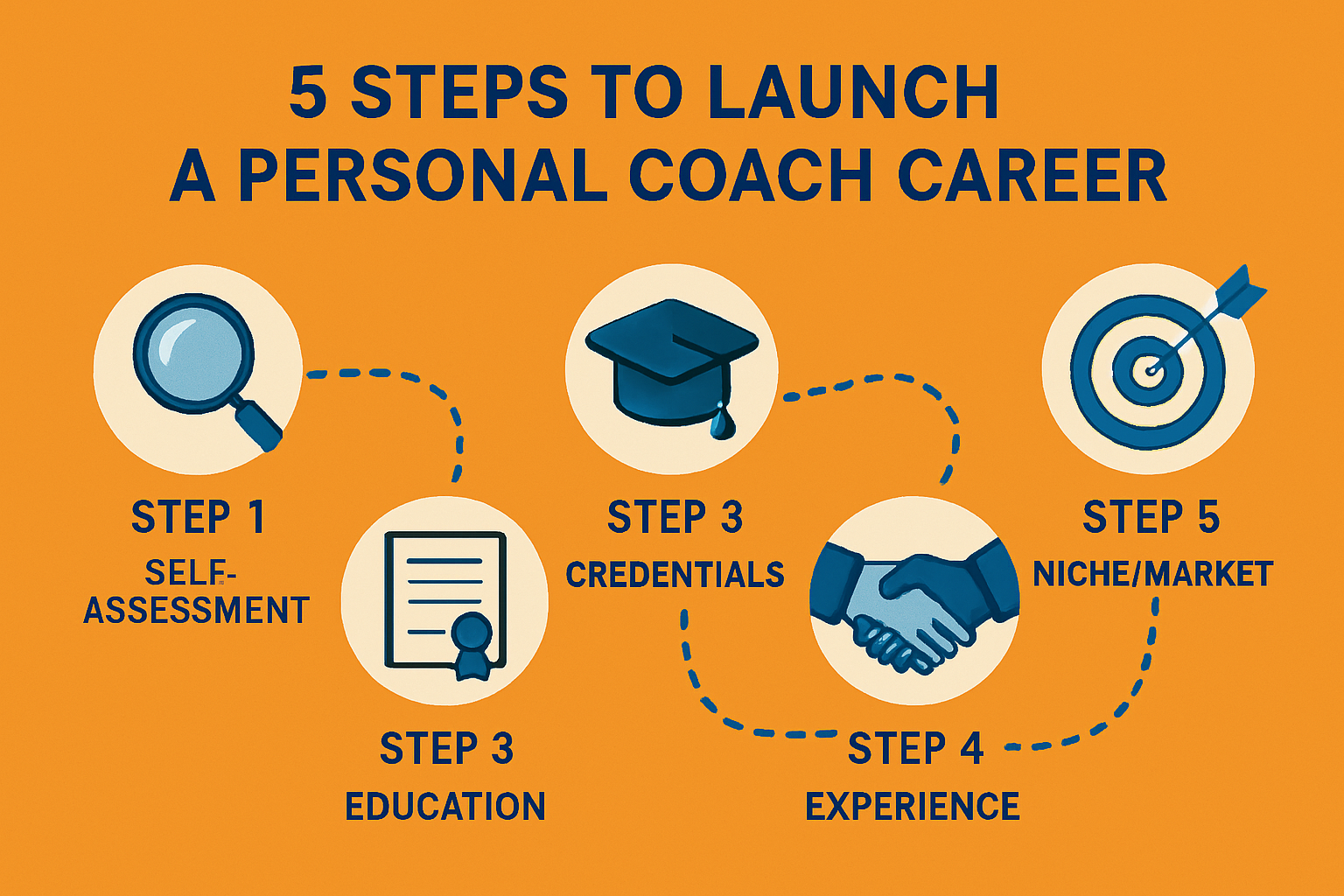
Step 1: Self-Assessment and Readiness
Before you dive into a personal coach career, take time to reflect on your motivations. Are you passionate about helping others grow? Assess which skills from your past experiences—like teaching, counseling, or mentoring—could support your new path.
Try self-reflection exercises, such as journaling about your strengths and areas for growth. Consider feedback from peers or mentors. This process helps reveal if coaching aligns with your values and sets the stage for your personal coach career.
- List your top three strengths and how they could help clients.
- Identify one area for development and make a plan to address it.
- Write down your "why" for pursuing a personal coach career.
By starting with self-awareness, you’ll lay a solid foundation for every step that follows.
Step 2: Education and Training Options
Education is crucial for a successful personal coach career. There are various pathways, from short certificate courses to comprehensive diplomas and degrees. Top programs are accredited by organizations like ICF, EMCC, and CCE.
Compare online with in-person options. Online training offers flexibility, while in-person formats provide hands-on interaction. Costs can range from $1,500 for entry-level certificates to over $10,000 for advanced programs.
| Program Type | Typical Cost | Duration | Format |
|---|---|---|---|
| Certificate | $1,500–$3,000 | 3–6 months | Online/In-person |
| Diploma | $3,000–$7,000 | 6–12 months | Online/In-person |
| Degree | $8,000–$15,000 | 1–2 years | In-person |
Research thoroughly to choose a path that fits your goals and budget, ensuring your personal coach career starts on the right track.
Step 3: Earning Coaching Credentials and Certifications
Credentials are vital for credibility in your personal coach career. Most clients seek coaches with recognized certifications, such as those from ICF, EMCC, or the Board Certified Coach (BCC) program.
To earn credentials, you’ll complete training hours, mentorship, and pass exams. For example, becoming an ICF Associate Certified Coach (ACC) requires 60+ hours of training, 100 hours of coaching experience, and an ethics exam.
Did you know that 77% of coaches surveyed by ICF hold a credential? This shows how important certification is for building trust and attracting clients in your personal coach career.
- Choose your preferred certifying body.
- Track your training and coaching hours.
- Prepare for and pass required exams.
Credentials are your ticket to standing out in a growing industry.
Step 4: Gaining Practical Experience
Experience is the backbone of a thriving personal coach career. Start with practicum opportunities, peer coaching, or volunteering for non-profits and community groups.
Keep a coaching log to track sessions and collect feedback. Supervision and mentorship offer support as you refine your approach. Volunteering not only builds your skills but also expands your network.
- Offer free or discounted sessions to friends or community members.
- Seek feedback after each session to improve your coaching techniques.
- Find a mentor coach for guidance and accountability.
With hands-on experience, you’ll gain the confidence and skills needed to serve clients effectively in your personal coach career.
Step 5: Defining Your Niche and Target Market
Specializing is key to a sustainable personal coach career. Focus on a niche—such as career, wellness, or leadership coaching—to stand out in the market.
Identify your ideal client profile by researching market needs and gaps. Explore directories like the Directory of life coaches to see how other coaches position themselves and what niches are in demand.
- List potential niches that match your strengths and passions.
- Analyze market trends and client demographics.
- Study successful coaches who built practices by specializing.
A well-defined niche ensures your personal coach career is both rewarding and scalable.
Building Your Personal Coaching Practice
Starting your personal coach career means building a practice that reflects your values, skills, and goals. This section walks you through the essentials: shaping your core offer, covering legal basics, pricing, embracing technology, and using Noomii to find clients.
Crafting Your Unique Coaching Offer
Your coaching offer is the foundation of your personal coach career. Start by defining your coaching philosophy. What values guide your work? Do you focus on empowerment, accountability, or transformation?
Next, develop signature programs or packages. Will you offer individual sessions, group coaching, or a mix? Decide if you’ll coach virtually, in person, or both. For example, you might create a 12-week program for career changers or a monthly wellness group.
Consider these steps:
- Clarify your mission
- Identify your client outcomes
- Design clear session structures
A well-crafted offer helps you stand out and attract the right clients to your personal coach career.
Legal, Ethical, and Business Setup Essentials
Launching your personal coach career requires more than passion—it takes smart planning. Begin by registering your business, choosing a structure like an LLC or sole proprietorship. This protects you and clarifies your tax obligations.
Understand coaching ethics, especially around confidentiality and boundaries. Review professional guidelines from organizations like ICF. Always use contracts to outline services, expectations, and payment terms.
Don’t forget liability insurance. It’s a safeguard for both you and your clients. Many new coaches overlook legal basics—set yourself up for success by building a solid foundation for your personal coach career.
Setting Your Pricing and Packages
Pricing can feel daunting in a personal coach career, but clear packages make it easier for both you and your clients. Research what other coaches in your niche charge, and consider your experience and program length.
Here’s a simple comparison:
| Package Type | Typical Price Range | Includes |
|---|---|---|
| Single Session | $75 – $200 | 1 hour, action steps |
| 4-Session Pack | $300 – $700 | 4 sessions, email support |
| Group Program | $150 – $400/person | 6 weeks, group calls, resources |
Communicate the value, not just the price. As your personal coach career grows, revisit your rates and adjust as you gain experience.
Tools and Technology for Modern Coaches
Technology streamlines your personal coach career. Use scheduling tools like Calendly or Acuity to manage appointments. Video platforms such as Zoom or Google Meet make remote coaching seamless.
Client management software helps track progress and store notes securely. Online payment solutions like Stripe or PayPal simplify invoicing. Top coaching platforms in 2025 offer integrated scheduling, billing, and client portals.
Embracing technology frees you to focus on what matters: coaching and growing your personal coach career, not admin tasks.
How to Find Clients and Grow Your Coaching Practice with Noomii
Finding clients is often the biggest challenge in a personal coach career. Noomii, the world’s largest online coach directory, connects coaches with people actively seeking support.
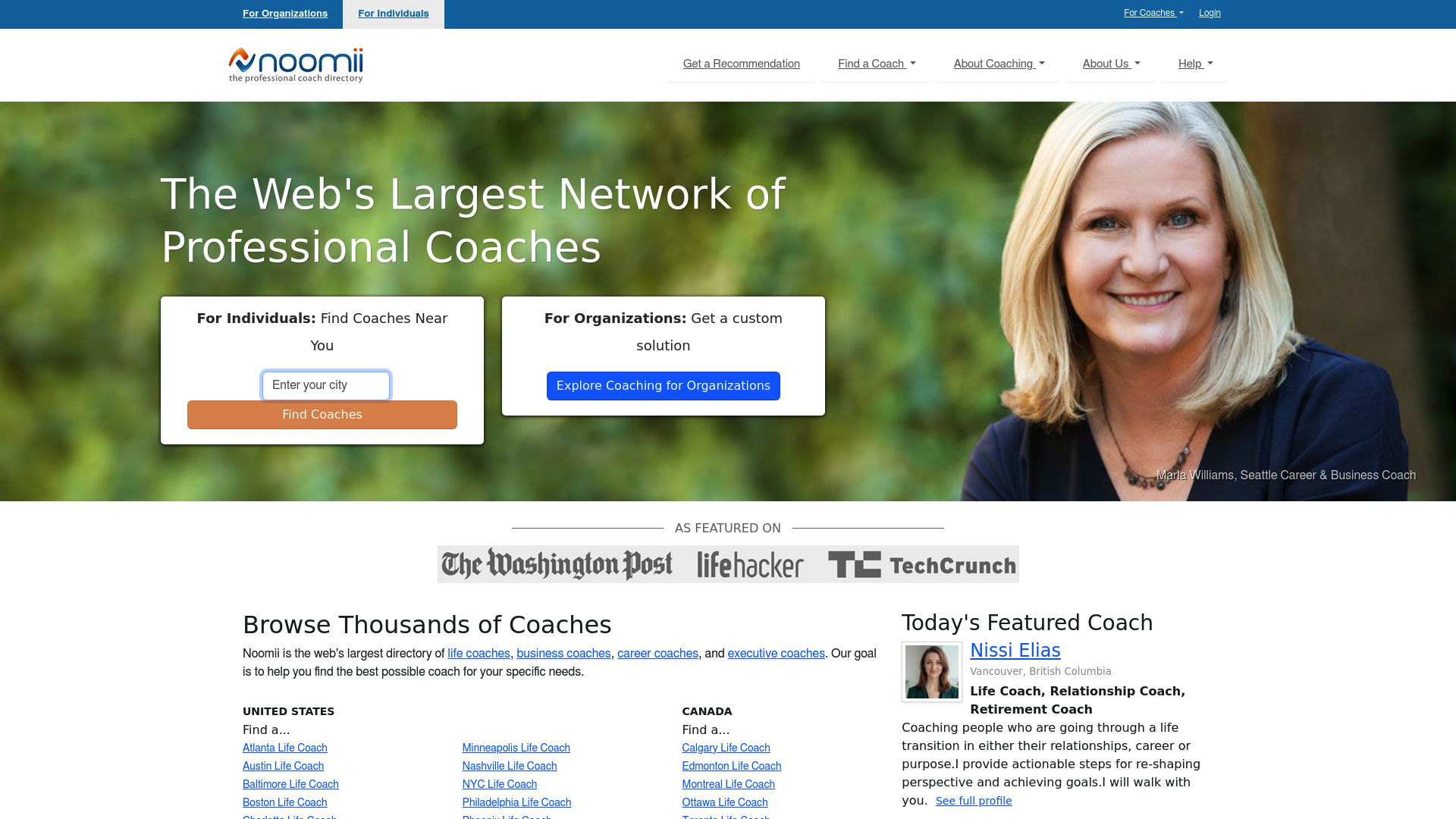
Noomii offers:
- Exposure to a global audience
- Lead generation through SmartMatch™
- Practice management tools
- Access to a supportive coaching community
To get started, create a detailed coach profile on Noomii. Many coaches have successfully grown their personal coach career by leveraging Noomii’s resources and client-matching features.
Marketing Yourself as a Personal Coach
Marketing is essential for building a thriving personal coach career. With the right strategies, you can connect with ideal clients, showcase your expertise, and stand out in a growing field. Let’s explore practical steps to elevate your visibility and credibility as a new coach.
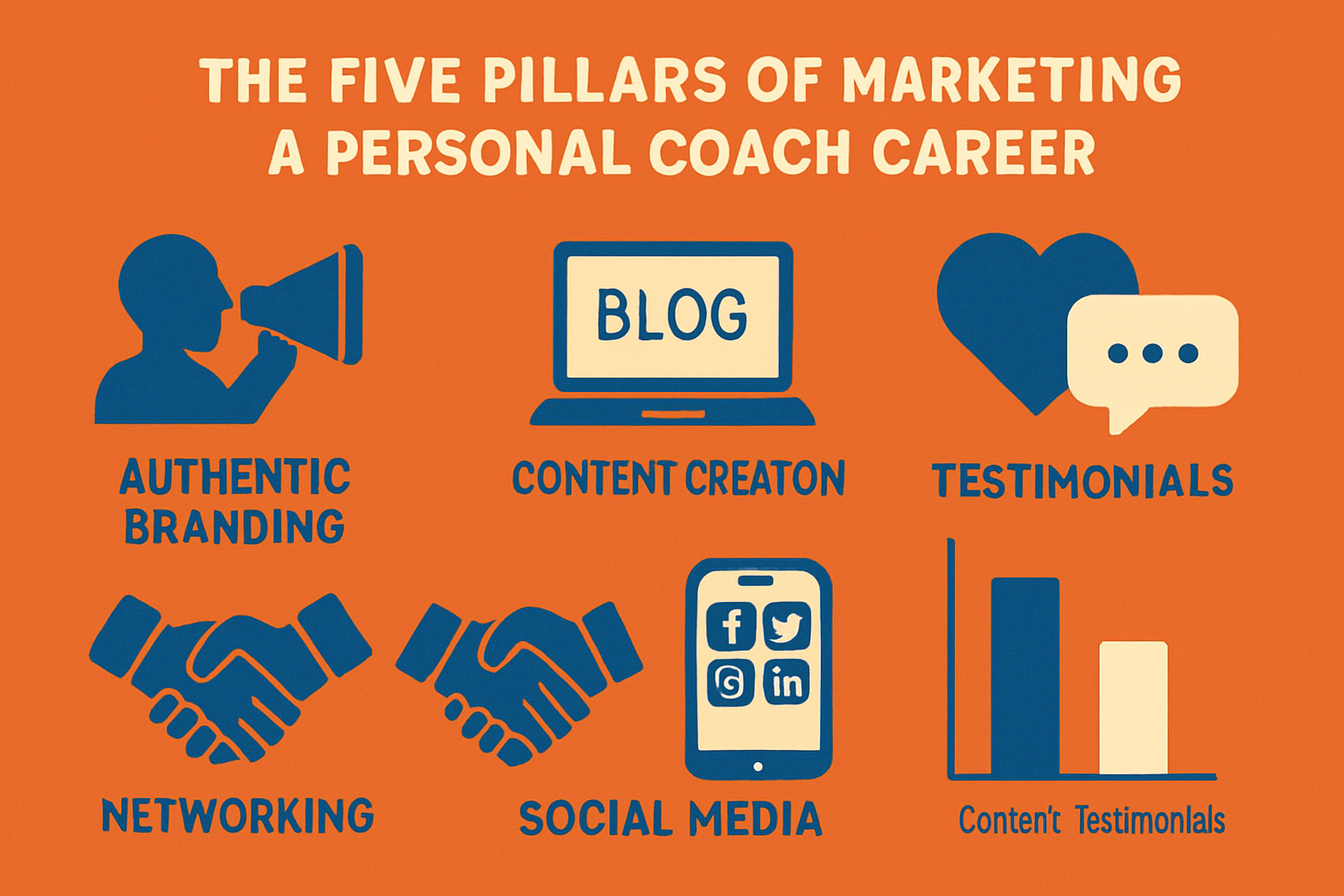
Building an Authentic Personal Brand
A strong personal brand is the foundation of a successful personal coach career. Start by clarifying your unique value proposition—what makes you different from other coaches? Share your story, values, and mission on your website and in your messaging.
Invest in a professional visual identity. This includes a memorable logo, cohesive color palette, and consistent imagery. Your brand should reflect your coaching philosophy and resonate with your target audience.
Consider these personal brand statement examples:
- “I help educators find balance and fulfillment in their careers.”
- “My mission is to empower women to lead with confidence.”
By building an authentic brand, you’ll attract clients who align with your values and vision for your personal coach career.
Creating Compelling Content and Thought Leadership
Content marketing helps establish your expertise and builds trust in your personal coach career. Start a blog, host a podcast, or create short videos addressing common challenges your clients face. Share actionable tips and client success stories (with permission).
Educational webinars and guest speaking at local events or online conferences can boost your visibility. Consistent content creation positions you as a thought leader in your niche.
Stay informed about industry trends. For example, the life coaching industry growth and trends show increasing demand for coaches who share insights openly.
By delivering valuable, relevant content, you’ll naturally attract your ideal clients to your personal coach career.
Networking and Partnerships
Networking is a cornerstone of any personal coach career. Join coaching associations like ICF or EMCC to connect with peers, mentors, and potential referral partners. Attend industry events, both in-person and virtually, to stay current and expand your network.
Collaborate with professionals in related fields, such as therapists or HR consultants. Partnerships can lead to client referrals and joint projects.
Exploring niche opportunities, such as business coaching opportunities, can also open doors to new audiences. Building genuine relationships helps your personal coach career grow organically.
Leveraging Social Media and Online Platforms
Social media is a powerful tool for growing your personal coach career. Choose platforms where your ideal clients are active—LinkedIn for professionals, Instagram for wellness seekers, or Facebook for community groups.
Share educational posts, client testimonials, and behind-the-scenes glimpses into your coaching process. Engage with followers by answering questions and participating in relevant discussions.
Consider running targeted ads or joining coaching directories for additional exposure. Building an engaged online community increases your reach and builds trust in your personal coach career.
Client Testimonials and Referrals
Social proof is essential for a thriving personal coach career. Collect testimonials from satisfied clients, ensuring you follow ethical guidelines and obtain permission to share their stories.
Display testimonials prominently on your website, social media, and marketing materials. Create a simple referral program to encourage happy clients to spread the word.
Here’s a template for requesting testimonials: “Would you be willing to share a few sentences about your experience working with me? Your feedback helps others find the right personal coach for their needs.”
By leveraging testimonials and referrals, you strengthen your reputation and credibility in your personal coach career.
Navigating Challenges and Future Trends in Coaching
Embarking on a personal coach career in 2025 is an exciting and meaningful journey, but it comes with unique challenges and evolving trends. To thrive, new coaches must be adaptable, stay informed, and continually measure their growth. Here’s how to navigate the landscape and prepare for a rewarding path ahead.
Overcoming Common Challenges for New Coaches
Starting a personal coach career often means facing doubts and obstacles. Imposter syndrome is common, especially when coaches compare themselves to seasoned professionals. It’s important to remember that every coach starts somewhere.
Managing an inconsistent income stream can also feel daunting. Building a steady client base takes time and persistence. Many new coaches struggle to balance their personal coach career with other life commitments, whether it’s another job or family responsibilities.
Practical strategies for overcoming these hurdles include:
- Setting realistic short-term goals for your personal coach career.
- Seeking mentorship and peer support from experienced coaches.
- Celebrating small wins and learning from setbacks.
By acknowledging these challenges and developing coping strategies, you can build the resilience needed for long-term success in your personal coach career.
Staying Current with Industry Trends
The coaching landscape is shifting rapidly, and staying ahead is essential for anyone pursuing a personal coach career. One major trend is the integration of digital tools and artificial intelligence, which are transforming how coaches connect with clients and deliver services. For example, AI chatbots offering workplace counsel are making coaching more accessible and efficient.
There’s also a growing focus on mental health and holistic wellness, with clients seeking support that addresses both personal and professional growth. Virtual coaching platforms are becoming the norm, and the adoption rate continues to climb each year.
To stay relevant, it’s crucial to embrace technology, stay informed about new methodologies, and be open to new approaches that enhance your personal coach career.
Continuous Professional Development
Lifelong learning is at the heart of a successful personal coach career. Ongoing education not only keeps your skills sharp but also boosts your credibility and confidence. Many coaches pursue advanced certifications or specialize in emerging niches.
Joining mastermind groups and peer supervision sessions provides valuable feedback and fosters accountability. Exploring innovative approaches, such as holistic life coaching approaches, can set you apart in a crowded market.
Resources to consider:
- Advanced courses from recognized coaching organizations
- Peer-led discussion groups
- Industry conferences and webinars
Investing in your professional development ensures you remain effective and fulfilled as your personal coach career evolves.
The Globalization of Coaching
In today's digital world, a personal coach career can reach far beyond local borders. Coaches now work with clients worldwide, thanks to virtual meeting platforms and global directories. This expansion brings new opportunities but also requires sensitivity to cultural differences.
Navigating cross-cultural coaching means being aware of diverse values, communication styles, and legal or ethical considerations. The global coaching market is growing rapidly, opening doors for those willing to adapt and learn.
Building a worldwide practice can be both rewarding and challenging, but it makes the personal coach career more dynamic and impactful than ever before.
Measuring Success and Impact
Tracking your progress is vital in any personal coach career. Measuring client outcomes, gathering feedback, and refining your methods help ensure you’re making a genuine difference.
Set clear personal and business growth goals. Use tools like client surveys, progress charts, and self-reflection exercises to evaluate your effectiveness. Metrics such as client retention, satisfaction scores, and referral rates offer valuable insights.
Regularly assessing your impact not only supports client growth but also fuels your own development and satisfaction in your personal coach career.
Ready to take the first real step toward your coaching career? You’ve just explored the essential skills, training options, and practical strategies to launch your practice—and now it’s time to put your name out there. The best way to start attracting clients and building your reputation is by making yourself visible where people are already searching for coaches. Join a thriving community of professionals and let clients find you with ease. You can Get Your Free Listing and start growing your coaching practice today. Your journey begins with one simple action—let’s make it happen!
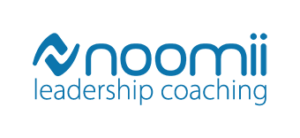
Leave a Reply
Want to join the discussion?Feel free to contribute!